-
 Bitcoin
Bitcoin $108,522.9936
0.51% -
 Ethereum
Ethereum $2,600.2119
2.25% -
 Tether USDt
Tether USDt $1.0001
0.00% -
 XRP
XRP $2.3065
1.88% -
 BNB
BNB $661.9093
0.34% -
 Solana
Solana $150.9961
1.40% -
 USDC
USDC $0.9999
0.00% -
 TRON
TRON $0.2877
0.21% -
 Dogecoin
Dogecoin $0.1708
1.78% -
 Cardano
Cardano $0.5863
1.70% -
 Hyperliquid
Hyperliquid $39.0718
4.52% -
 Bitcoin Cash
Bitcoin Cash $507.4600
2.09% -
 Sui
Sui $2.9070
2.06% -
 Chainlink
Chainlink $13.8666
4.64% -
 UNUS SED LEO
UNUS SED LEO $9.1277
0.82% -
 Stellar
Stellar $0.2624
5.86% -
 Avalanche
Avalanche $18.1961
2.40% -
 Shiba Inu
Shiba Inu $0.0...01182
1.77% -
 Toncoin
Toncoin $2.8141
2.42% -
 Hedera
Hedera $0.1611
3.70% -
 Litecoin
Litecoin $87.6537
1.88% -
 Monero
Monero $317.0356
0.02% -
 Polkadot
Polkadot $3.4327
2.63% -
 Dai
Dai $1.0000
-0.01% -
 Ethena USDe
Ethena USDe $1.0006
0.05% -
 Bitget Token
Bitget Token $4.3043
0.50% -
 Uniswap
Uniswap $7.6006
2.93% -
 Aave
Aave $293.0019
4.60% -
 Pepe
Pepe $0.0...01007
3.08% -
 Pi
Pi $0.4658
2.42%
Will the funds be returned if the Ethereum wallet transfer fails?
Ethereum transactions are irreversible; failed transfers aren't automatically refunded. The cause determines the outcome: insufficient gas fees means funds remain; wrong address means likely loss; wallet issues may leave funds untouched.
Mar 25, 2025 at 02:56 am
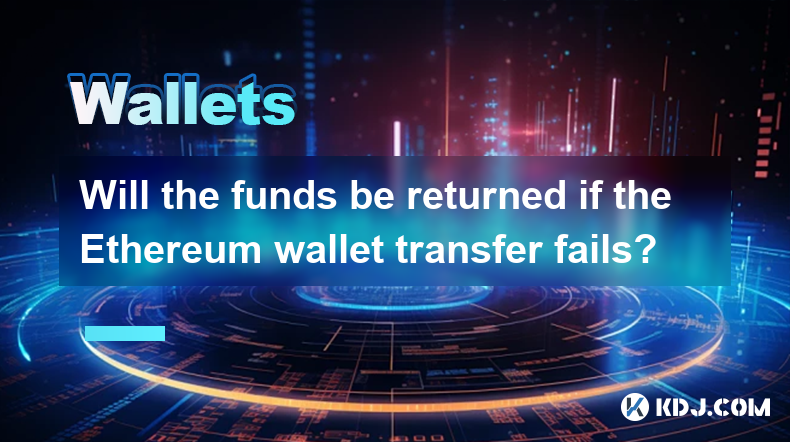
Will the funds be returned if the Ethereum wallet transfer fails?
Ethereum, like other cryptocurrencies, operates on a decentralized, immutable blockchain. This means once a transaction is confirmed on the network, it cannot be reversed. A failed transfer, therefore, doesn't automatically mean a refund. The outcome depends heavily on the reason for the failure. Let's explore the various scenarios.
One common reason for failed transfers is an incorrect recipient address. If you input the wrong address, your ETH is sent to an unknown wallet, and recovering it is exceptionally difficult, if not impossible. There's no mechanism for reversing the transaction on the Ethereum network itself. The funds are essentially lost.
Another potential problem lies in insufficient gas fees. Ethereum transactions require gas, a fee paid to miners for processing the transaction. If you underestimate the required gas, your transaction might fail to be included in a block, resulting in a pending transaction that eventually times out. In this scenario, your ETH remains in your wallet, but the transaction fails to complete. You simply need to resubmit the transaction with a higher gas fee.
Network congestion can also cause delays or failures. During periods of high activity on the Ethereum network, transactions can take longer to confirm, or even fail entirely due to congestion. In such cases, the transaction may remain pending for an extended period. Increasing the gas fee can often help push the transaction through. However, if the network remains heavily congested, the transaction might ultimately fail. Your funds, however, remain in your wallet.
Issues with your wallet software itself are another possibility. Bugs, glitches, or even incorrect configurations within your wallet can prevent a successful transfer. Troubleshooting your wallet, updating the software, or trying a different wallet might resolve the issue. Again, your funds likely remain untouched in your wallet in this scenario.
Private key compromise is a serious issue. If your private key is stolen or compromised, an attacker could potentially drain your wallet. There is no way to retrieve the funds once transferred by a malicious actor. Security best practices, such as using strong passwords and secure hardware wallets, are crucial to prevent this.
Finally, some failures might stem from issues on the receiving end. The recipient's wallet might be full, have insufficient funds for receiving, or be malfunctioning. In such instances, the funds typically remain in the sender's wallet. You would need to contact the recipient to troubleshoot the issue on their end.
Common Questions and Answers:
Q: What happens if I send ETH to the wrong address?
A: The ETH is essentially lost. Recovering funds sent to an incorrect address is extremely difficult, and often impossible, due to the decentralized and immutable nature of the blockchain.
Q: My transaction is pending. What should I do?
A: Increase the gas fee and try resubmitting the transaction. Network congestion can cause delays, but a higher gas fee usually helps prioritize your transaction.
Q: My Ethereum wallet transfer failed due to insufficient gas. Are my funds lost?
A: No, your funds remain in your wallet. You need to resubmit the transaction with a higher gas fee.
Q: Can I reverse an Ethereum transaction?
A: No, confirmed Ethereum transactions are irreversible due to the blockchain's immutable nature.
Q: What if my Ethereum wallet software caused the transfer failure?
A: Troubleshoot your wallet, update the software, or try using a different wallet. Your funds should still be in your wallet.
Q: My private key was compromised. Can I recover my funds?
A: Likely not. Funds sent by a malicious actor using your compromised private key are difficult, if not impossible, to recover.
Q: The recipient's wallet caused the transfer failure. What now?
A: Contact the recipient to resolve the issue on their end. Your funds remain in your wallet.
Q: Is there any recourse if an exchange caused my transfer failure?
A: Contact the exchange's customer support immediately. Their internal processes might offer some recourse, but this is not guaranteed.
Q: What are the best practices to prevent Ethereum transfer failures?
A: Double-check recipient addresses, estimate gas fees accurately, use reputable wallets, and practice good security hygiene.
Disclaimer:info@kdj.com
The information provided is not trading advice. kdj.com does not assume any responsibility for any investments made based on the information provided in this article. Cryptocurrencies are highly volatile and it is highly recommended that you invest with caution after thorough research!
If you believe that the content used on this website infringes your copyright, please contact us immediately (info@kdj.com) and we will delete it promptly.
- Crypto ATMs, New Zealand, and Money Laundering: A Crackdown in the Kiwi Crypto Scene
- 2025-07-09 16:50:12
- Shiba Inu (SHIB) in 2030: Could You Be a Crypto Millionaire?
- 2025-07-09 16:50:12
- HTX Security: Navigating Crypto Hacks and Risk Management in the Wild West
- 2025-07-09 17:10:13
- Polygon's POL Token Surges Ahead of Heimdall v2 Upgrade: A New York Minute on What's Happening
- 2025-07-09 17:10:13
- Coin Master Free Spins: Grab 'Em While They're Hot! (July 8, 2025)
- 2025-07-09 17:15:12
- Meme Coin Mania: How to Create a Coin That Doesn't Flop (and Maybe Even Moons!)
- 2025-07-09 17:15:12
Related knowledge
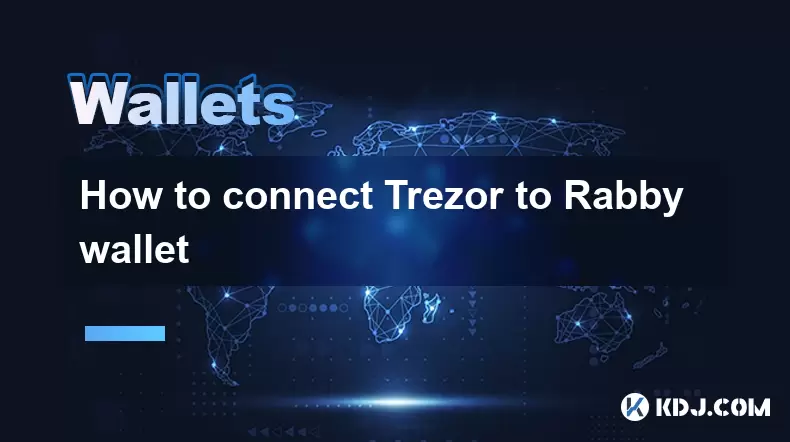
How to connect Trezor to Rabby wallet
Jul 09,2025 at 05:49am
What Is Trezor and Rabby Wallet?Trezor is a hardware wallet developed by SatoshiLabs that allows users to securely store their cryptocurrency assets o...
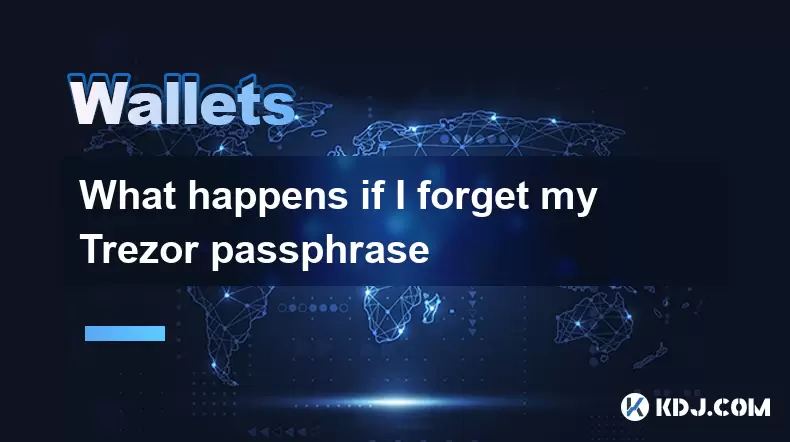
What happens if I forget my Trezor passphrase
Jul 09,2025 at 03:15am
Understanding the Role of a Trezor PassphraseIf you use a Trezor hardware wallet, you may have set up a passphrase as an extra layer of security beyon...
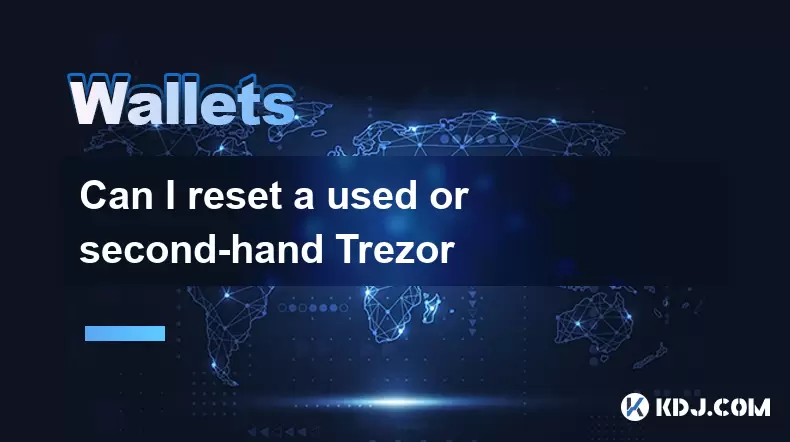
Can I reset a used or second-hand Trezor
Jul 09,2025 at 11:49am
Understanding the Reset Process for a Used or Second-Hand TrezorIf you have acquired a used or second-hand Trezor wallet, one of the first things you ...
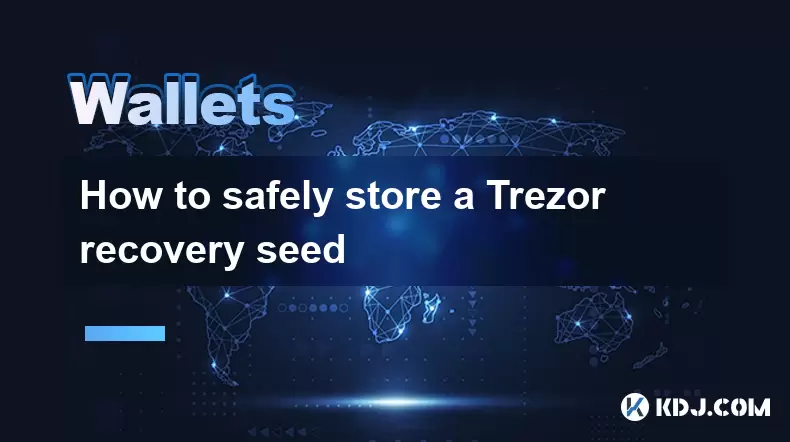
How to safely store a Trezor recovery seed
Jul 09,2025 at 11:22am
Understanding the Importance of a Trezor Recovery SeedA Trezor recovery seed is a sequence of 12 or 24 words generated during the initial setup of you...
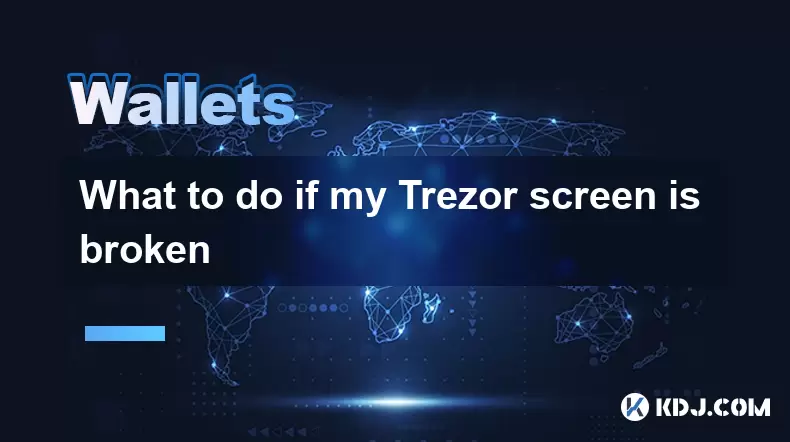
What to do if my Trezor screen is broken
Jul 09,2025 at 10:36am
Understanding the Impact of a Broken Trezor ScreenIf your Trezor screen is broken, it can significantly affect how you interact with your cryptocurren...
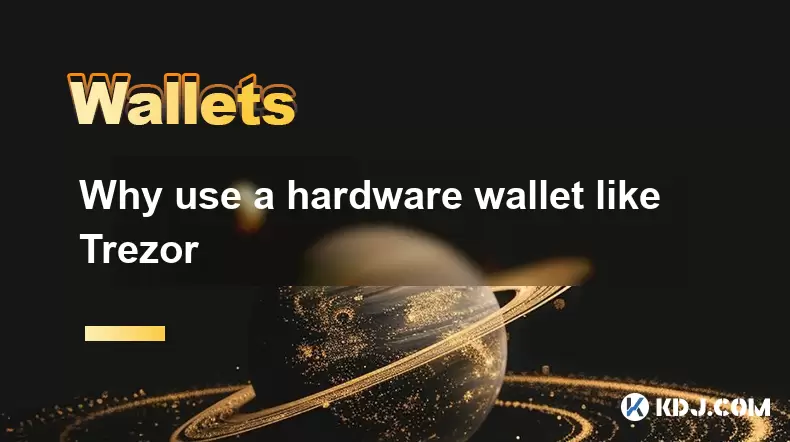
Why use a hardware wallet like Trezor
Jul 09,2025 at 11:00am
What Is a Hardware Wallet and Why It MattersA hardware wallet is a physical device designed to securely store the private keys of cryptocurrencies off...

How to connect Trezor to Rabby wallet
Jul 09,2025 at 05:49am
What Is Trezor and Rabby Wallet?Trezor is a hardware wallet developed by SatoshiLabs that allows users to securely store their cryptocurrency assets o...

What happens if I forget my Trezor passphrase
Jul 09,2025 at 03:15am
Understanding the Role of a Trezor PassphraseIf you use a Trezor hardware wallet, you may have set up a passphrase as an extra layer of security beyon...

Can I reset a used or second-hand Trezor
Jul 09,2025 at 11:49am
Understanding the Reset Process for a Used or Second-Hand TrezorIf you have acquired a used or second-hand Trezor wallet, one of the first things you ...

How to safely store a Trezor recovery seed
Jul 09,2025 at 11:22am
Understanding the Importance of a Trezor Recovery SeedA Trezor recovery seed is a sequence of 12 or 24 words generated during the initial setup of you...

What to do if my Trezor screen is broken
Jul 09,2025 at 10:36am
Understanding the Impact of a Broken Trezor ScreenIf your Trezor screen is broken, it can significantly affect how you interact with your cryptocurren...

Why use a hardware wallet like Trezor
Jul 09,2025 at 11:00am
What Is a Hardware Wallet and Why It MattersA hardware wallet is a physical device designed to securely store the private keys of cryptocurrencies off...
See all articles

























































































